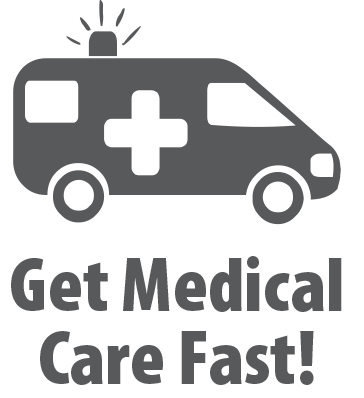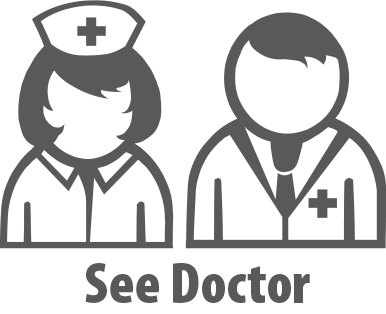Respiratory conditions
Wheezing
Wheezing means you are having a problem with breathing. Air is flowing through swollen or tight breathing tubes.
Signs & Symptoms
• A high-pitched squeaky or whistling sound. This is heard more on breathing out than in.
• Chest tightness.
Causes
• Asthma (the main cause).
• Allergic reactions.
• Congestive heart failure.
• Respiratory infections.
• Something caught in the windpipe.
• Smoking, air pollution, etc.
Treatment
Treatment depends on the cause. Medication to relieve narrowing of the airways is usually given for acute attacks of wheezing.
Questions to Ask
Question
01
With wheezing, do you have severe shortness of breath; blue-colored lips, skin, or fingernails; or are you unable to talk?

Get medical care without delay. If symptoms are life threatening go to the ER or call 9-1-1. Don’t call 9-1-1 or use the ER if symptoms do not threaten life. Ask your doctor ahead of time where you should go for a problem that needs prompt care, but not emergency care.
x
Question
02
With wheezing, do any of these problems occur?
• Decreasing level of consciousness or mental status changes.
• Fever higher than 101ºF in a baby less than 3 months old; 104ºF or higher in a child between 3 months and 3 years old.
• The wheezing started in the last few hours and bubbly pink or white phlegm is being coughed up.

Get medical care without delay. If symptoms are life threatening go to the ER or call 9-1-1. Don’t call 9-1-1 or use the ER if symptoms do not threaten life. Ask your doctor ahead of time where you should go for a problem that needs prompt care, but not emergency care.
x
Question
03
Did wheezing begin after an insect sting, taking medication, or exposure to something that caused a severe allergic reaction in the past?

Get medical care without delay. If symptoms are life threatening go to the ER or call 9-1-1. Don’t call 9-1-1 or use the ER if symptoms do not threaten life. Ask your doctor ahead of time where you should go for a problem that needs prompt care, but not emergency care.
x
Question
04
Does wheezing occur in a child between 3 months and 3 years of age who has a fever of 102.2ºF and up to 104ºF?

You should be seen by your doctor for medical advice. Contact your doctor or health care provider to find out how soon you should be seen.
x
Self-Care / Prevention
• Take prescribed medicines as directed.
• Drink plenty of fluids.
• Use a cool-mist vaporizer.
• Don’t smoke. Avoid secondhand smoke.
• Chew foods well before swallowing. When you eat, try not to laugh and swallow at the same time.
• Keep small objects that can easily be inhaled away from children under age 5.

Download an offline pdf file.
2021 © American Institute for Preventive Medicine - All Rights Reserved. Disclaimer | www.HealthyLife.com








